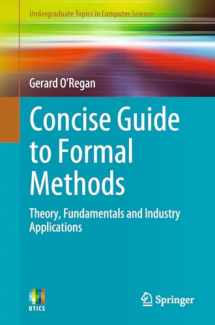
Concise Guide to Formal Methods: Theory, Fundamentals and Industry Applications (Undergraduate Topics in Computer Science)
ISBN-13:
9783319640204
ISBN-10:
3319640208
Edition:
1st ed. 2017
Author:
Gerard ORegan
Publication date:
2017
Publisher:
Springer
Format:
Paperback
348 pages
Category:
AI & Machine Learning
,
Computer Science
FREE US shipping
Book details
ISBN-13:
9783319640204
ISBN-10:
3319640208
Edition:
1st ed. 2017
Author:
Gerard ORegan
Publication date:
2017
Publisher:
Springer
Format:
Paperback
348 pages
Category:
AI & Machine Learning
,
Computer Science
Summary
Concise Guide to Formal Methods: Theory, Fundamentals and Industry Applications (Undergraduate Topics in Computer Science) (ISBN-13: 9783319640204 and ISBN-10: 3319640208), written by authors
Gerard ORegan, was published by Springer in 2017.
With an overall rating of 3.6 stars, it's a notable title among other
AI & Machine Learning
(Computer Science) books. You can easily purchase or rent Concise Guide to Formal Methods: Theory, Fundamentals and Industry Applications (Undergraduate Topics in Computer Science) (Paperback) from BooksRun,
along with many other new and used
AI & Machine Learning
books
and textbooks.
And, if you're looking to sell your copy, our current buyback offer is $1.73.
Description
This invaluable textbook/reference provides an easy-to-read guide to the fundamentals of formal methods, highlighting the rich applications of formal methods across a diverse range of areas of computing.
Topics and features: introduces the key concepts in software engineering, software reliability and dependability, formal methods, and discrete mathematics; presents a short history of logic, from Aristotle’s syllogistic logic and the logic of the Stoics, through Boole’s symbolic logic, to Frege’s work on predicate logic; covers propositional and predicate logic, as well as more advanced topics such as fuzzy logic, temporal logic, intuitionistic logic, undefined values, and the applications of logic to AI; examines the Z specification language, the Vienna Development Method (VDM) and Irish School of VDM, and the unified modelling language (UML); discusses Dijkstra’s calculus of weakest preconditions, Hoare’s axiomatic semantics of programming languages, and the classical approach of Parnas and his tabular expressions; provides coverage of automata theory, probability and statistics, model checking, and the nature of proof and theorem proving; reviews a selection of tools available to support the formal methodist, and considers the transfer of formal methods to industry; includes review questions and highlights key topics in every chapter, and supplies a helpful glossary at the end of the book.This stimulating guide provides a broad and accessible overview of formal methods for students of computer science and mathematics curious as to how formal methods are applied to the field of computing.


We would LOVE it if you could help us and other readers by reviewing the book
Book review

Congratulations! We have received your book review.
{user}
{createdAt}
by {truncated_author}


